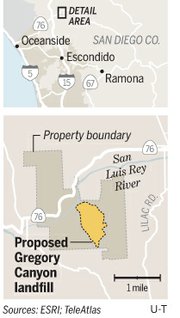Gregory Canyon landfill back on track?
By
J. Harry Jones, October 17, 2014
PALA
— The long-planned and controversial Gregory Canyon landfill,
whose developer has been plagued by financial problems the
past year, may be getting back on track.
The
developer, Gregory Canyon Ltd., is working with a private
equity firm that’s in the process of acquiring the company’s
debt and equity interests, and intends to refinance the landfill
project and restart the permitting processes, officials said.
 Gregory
Canyon spokeswoman Nancy Chase said the recent developments
are a good thing. Gregory
Canyon spokeswoman Nancy Chase said the recent developments
are a good thing.
“It’s
essentially a reorganization,” she said. “Sovereign
Capital Management Group specializes in buying distressed
properties, reorganizing, restructuring the debt, and the
entity will continue to be the same only they will be able
to refinance it under a restructuring.”
She
said the same legal, engineering and management team that
has led Gregory Canyon Ltd. will stay in place.
Chase
predicted that the permitting process could be completed by
the end of 2015.
Phone
calls to Sovereign officials were not returned this week,
but the reorganization plan was affirmed in a letter that
landfill Project Manager Jim Simmons sent to the county.
The
letter says Sovereign Capital is partnering with Herzog Contracting
Corp, which on Oct. 3 began foreclosure proceedings on the
1,700-acre Gregory Canyon property near Pala off state Route
76.
Simmons
says in the letter that Sovereign would acquire all Gregory
Canyon’s debt and equity, or foreclose on the property,
with the goal of moving “the project forward to secure
the necessary permits for the landfill with new funding from
Sovereign.”
According
to Sovereign Capital’s website, the company is a San
Diego-based private equity real estate firm that has completed
more than $5 billion in commercial real estate transaction
over the past decade.
Everett
DeLano, an environmental attorney who has been fighting the
landfill plan for years, said Gregory Canyon’s persistence
seems nonsensical.
“It’s
been a bad project from the start and it hasn’t changed
into a good one now,” DeLano said. “What they’re
asking essentially is for some sort of debt restructuring.
It really seems like a ‘good money after bad’ scenario.
Do you really want to continue to throw money at this project
after all these years?”
The
North County landfill has been in the planning stages for
more than two decades and would be built on land roughly 3
miles east of Interstate 15 and just south of state Route
76 in a canyon just west of the Pala Indian Reservation.
The
project has encountered a storm of opposition from groups
concerned about environmental fallout, ranging from the risk
of pollution to the San Luis Rey River to the loss of endangered
species habitat to the desecration of religious sites held
sacred by local Native American tribes.
In
January, the county stopped working on the project’s
air quality permit application because Gregory Canyon owed
roughly $350,000 in permit fees.
In
April, the Army Corps of Engineers withdrew the project’s
Clean Water Act permit application because the company failed
to provide costly information the Corps had requested.
Officials
say those permit applications can be reinstated if debts are
paid off and information is received.
Records
also show that Gregory Canyon hasn’t paid property taxes
on the site since 2012, and that its corporate status was
suspended in May.
Company
representatives said earlier this year that investors had
poured more than $62 million into the project since it was
first proposed more than two decades ago.
Over
the years, the landfill proposal has pitted environmental
groups, the Pala tribe and several local municipalities against
project developers who have argued the project is key to serving
the region’s trash needs.
In
1994, voters approved Proposition C, a measure that amended
the county’s general plan and zoning ordinance to allow
a landfill without a major-use permit, thereby streamlining
the project’s approval. Ten years later, the project
withstood another major challenge when voters rejected a ballot
initiative that would have invalidated Prop. C.
In
both campaigns, millions of dollars were spent by both sides.
top
|











